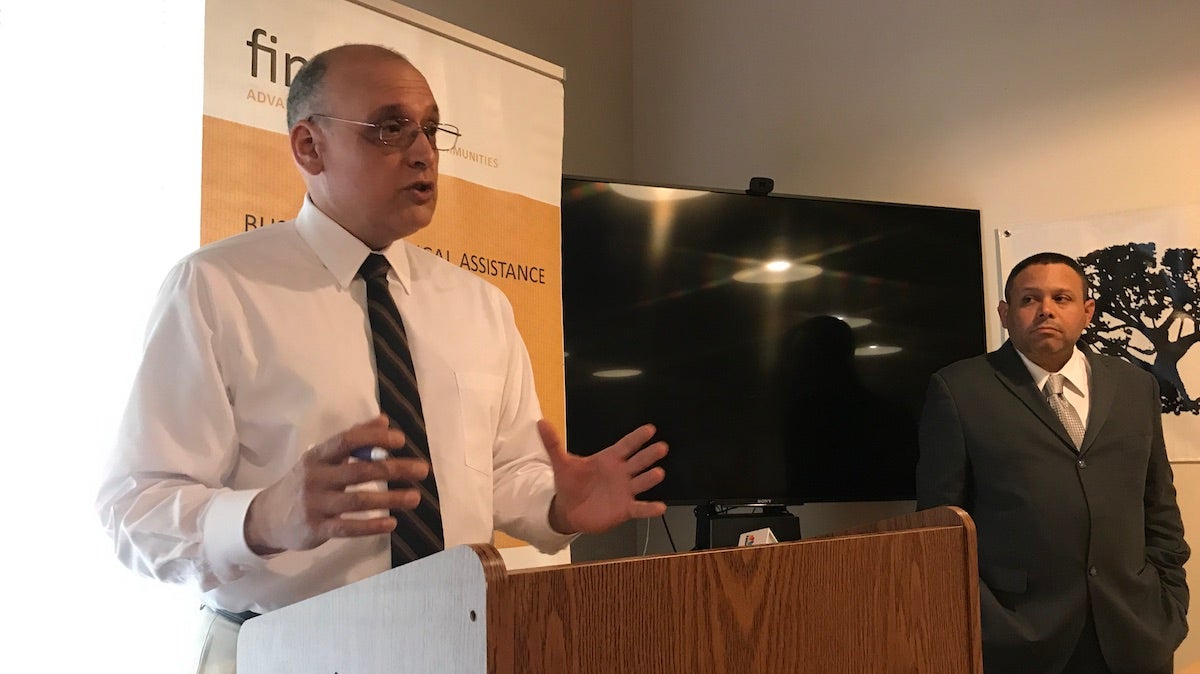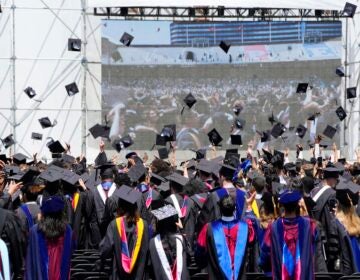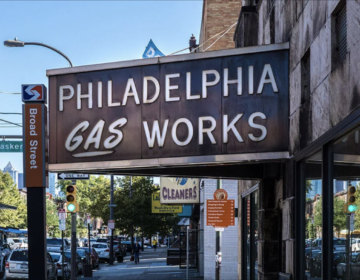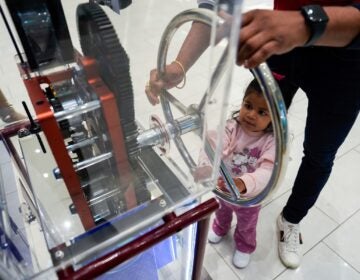Paving way to citizenship, new Philly program offers eligible immigrants financial tools

Will Gonzalez with the nonprofit community organization Ceiba introduces Programa Adelante at Finanta, another nonprofit organization, in North Philadelphia. (Laura Benshoff / WHYY)
More than 90 percent of all Latinos with lawful permanent status in the United States say they would become citizens if they could, according to a 2013 report by the Pew Hispanic Center.
The second-largest barrier respondents cited was cost. Interest in naturalization has spiked under President Donald Trump, pushing some in the social service community to address those costs.
“That could be medical fees, lawyer fees, the fees to file the forms,” said Taylor De la Pena, program coordinator with the nonprofit Ceiba in North Philadelphia. Ceiba, along with other economic development groups catering to Latinos, is heading up a new initiative — Programa Adelante — to help lawful immigrants to the U.S. cover those costs.
For example, a citizenship petition to U.S. Citizenship and Immigration Services costs $725 for the paperwork, including a fee for gathering biometric information required by the government. Legal fees can tack on hundreds more.
“That can cost a couple of hundred dollars at a nonprofit to thousands of dollars with a private attorney,” said Mary Clark, executive director of Esperanza Immigration Legal Services. It wouldn’t be uncommon for an immigrant to pay around $6,000 for a private attorney’s help in filing a petition, she said.
At no cost, Programa Adelante will give low- to moderate-income green card holders or other legal immigrants nine months of financial counseling and a secure loan to help build their credit. Secure loans are more like a savings account that helps build credit than a traditional loan. Program members will pay into a fund that will be tracked by the credit bureau, translating into a higher score and qualifying them for some matching grants.
“Some that are a good fit are DACA [Deferred Action for Child Arrivals] and permanent residency because to renew every few years costs the same as filing for the first time,” said De La Pena, resulting in a higher cost over time than the naturalization process.
At the end, immigrants will have saved a $1,000 they can take out to help cover costs related to any immigration status for which they qualify, with up to $300 available in matching grants.
To qualify, participants must meet the following criteria, which may be difficult for some low-income immigrants:
- have an SSN or ITIN number;
- have a valid photo ID;
- be eligible for an immigration remedy;
- have a source of income;
- meet program’s income requirements [between 200 and 300 percent above the federal poverty, depending on the cost of the
- type of immigration status applying for];
- have a bank account;
- have prepared your taxes the previous year and be willing to prepare them again.
Staring in September, the pilot program aims to accommodate 20 participants. For now, the only available language of instruction is Spanish.
The program is just one look at how to turn immigrant residents into civically engaged Philadelphians. The John S. and James L. Knight Foundation awarded the Welcoming Center for New Pennsylvanians a $250,000 grant to find ways to “promote citizenship among immigrants who hold green cards.”
Immigrants cited three barriers to that quest — cost, adequate information about the process, and whether to trust officials, according to a statement by Alberto Ibarguen, president and CEO of the Knight Foundation.
WHYY is your source for fact-based, in-depth journalism and information. As a nonprofit organization, we rely on financial support from readers like you. Please give today.




